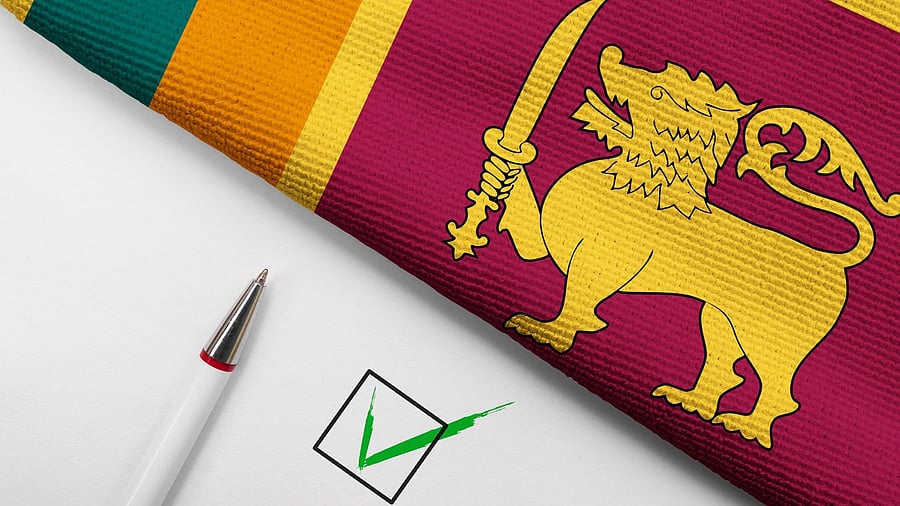
Representative image of voting for elections in Sri Lanka
Credit: iStock Photo
Chennai: With just a fortnight to go for the high-stakes Presidential polls in Sri Lanka, the country’s largest ethnic minority of Tamils are still divided on whom to support in the September 21 elections, which is witnessing an unprecedented and intense four-cornered contest.
While a coalition of Tamil political parties have fielded Pakkiyaselvam Ariyanethiran as the common candidate, the country’s largest Tamil party, Ilankai Tamil Arasu Kachchi (ITAK), has extended its support to Sajith Premadasa of the Samagi Jana Balawegaya (SJB), exposing chinks within the linguistic and religious minority community.
President Ranil Wickremesinghe of the United National Party (UNP), Anura Dissanayake of the Janatha Vimukthi Peramuna (JVP), and Namal Rajapaksa of the Sri Lanka People’s Party (SLPP) are also actively wooing Tamils, who constitute 11 per cent of the island’s population spread across the northern and eastern parts.
Muslims, who also speak Tamil but identify themselves as a separate ethnic group, are likely to vote for Sajith with the Sri Lanka Muslim Congress putting its weight behind the Leader of Opposition. The community constitutes about 9 per cent of the island’s population.
In 2019 too, Tamils voted in favour of Sajith but a massive Sinhala consolidation behind Gotabhaya Rajapaksa in the aftermath of the April 2019 Easter bombings helped the latter win at the hustings by a landslide.
But the two communities voting overwhelmingly in favour of Sajith could tilt the race in favour of him this time, but the deep political divisions in the Tamil community could come in the way.
While fielding a “common Tamil candidate” has always been a failure, Tamils felt all political parties will come together this time to support one candidate by extracting an assurance on a long-lasting solution to the long-pending Tamil question.
Tamils want the implementation of the 13th Amendment, an integral part of the Indo-Sri Lanka agreement signed in 1987, that allows devolution of powers to local governments in the north and the east. However, successive dispensations failed to implement the promise made to Tamils, who still feel like “second-class citizens” in their own country even 15 years after the end of the war.
ITAK MP M A Sumanthiran said the party has taken an “unreserved official decision” to support Sajith Premadasa in the September 21 elections. “That is the position of every member of our party including myself. There is absolutely no confusion with regard to that position,” he said, while responding to reports of divisions within the party on the issue.
Sumanthiran, while outright dismissing the idea of a common candidate, termed it a “misguided strategy” while making it clear that Ariyanethran entering the race won’t do any good to Tamils.
“In the 2019 election, we supported Sajith, and we will continue to support him in 2024…We don’t know Anura well, and we know Ranil too well, and that is why we rejected him,” Sumanthiran told The Island newspaper. But there is intense opposition to the ITAK’s stand as well with many leaders of the party contesting the decision of the Executive Council.
Another senior politician who didn’t wish to be named told DH from Colombo that political parties in the North and East should have refrained from fielding a common candidate. “The goal is to find a solution, but what’s the point in fragmenting our votes? Tamils had committed several mistakes in the past, and the common candidate this time is only an addition to the long list,” the politician added.
It is widely believed that the total boycott of the 2005 Presidential polls by Tamil which was a handiwork of the LTTE was the reason for Ranil to lose the election that saw Mahinda Rajapaksa emerging victorious by a small margin.
Senior journalist and long-time Lanka watcher R Bhagwan Singh told DH that the bane of the Tamil community is as much lack of unity as the insensitivity and even “cruelty” from the Sinhala politicians towards the minorities in the little island.
“That the Tamils in the non-ITAK have chosen to put up a common candidate is at best a mere tokenism. The best would be to negotiate a post-poll package with the winnable candidate for their much mauled community. This will only be a good political move, but to carry on a Tamil fight will only expose their political vulnerability,” Singh added.